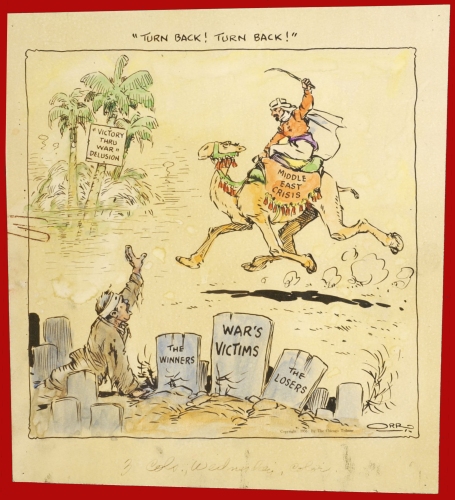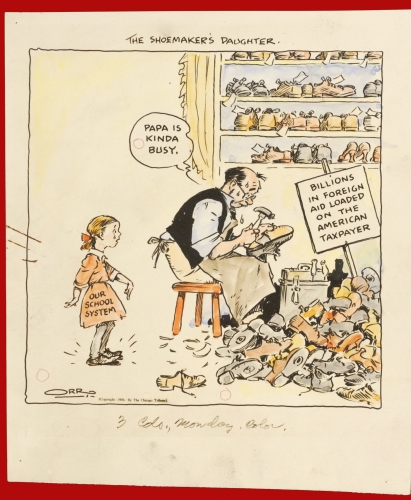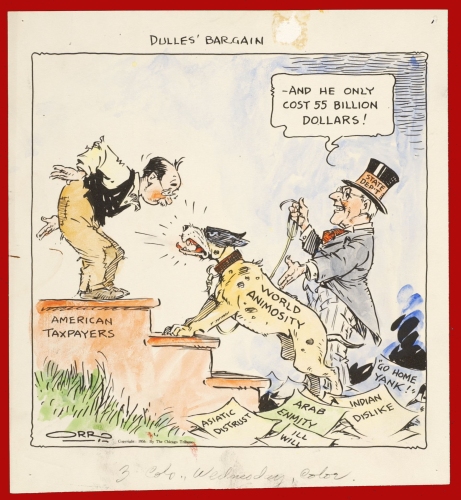

 NEED A LITTLE PERSPECTIVE on Iraq, global terrorism, and the elections? Step back and take a look at how wars and politics from the 1860s through the 1960s were drawn-and quartered-by some of the nation's most influential humorists and cartoonists, including Thomas Nast, D. C. Johnston, Carey Orr, Roy Justus, Boris Drucker, Ted Key, and Paul Conrad. This exhibition features dozens of original sketches by these and other artists that sharpen the teeth on the old saw of "plus ça change," "the more things change, the more they remain the same."
NEED A LITTLE PERSPECTIVE on Iraq, global terrorism, and the elections? Step back and take a look at how wars and politics from the 1860s through the 1960s were drawn-and quartered-by some of the nation's most influential humorists and cartoonists, including Thomas Nast, D. C. Johnston, Carey Orr, Roy Justus, Boris Drucker, Ted Key, and Paul Conrad. This exhibition features dozens of original sketches by these and other artists that sharpen the teeth on the old saw of "plus ça change," "the more things change, the more they remain the same."
 Charged with the mandate to create a repository to support research in the areas of architecture, industrial design, journalism, literature, music, philosophy, religion, photography, social and political history, transportation, and the visual and performing arts, a group of enterprising Syracuse University curators, particularly Martin H. Bush, displayed acute insight when, in the 1960s, they solicited contemporary manuscript collections from more than one hundred and fifty cartoonists. If the identification of cartoonists with academic research seemed somewhat farfetched at the time, the study of popular culture (including cartoons) has since been recognized as a reflection of nearly every aspect of society.
Charged with the mandate to create a repository to support research in the areas of architecture, industrial design, journalism, literature, music, philosophy, religion, photography, social and political history, transportation, and the visual and performing arts, a group of enterprising Syracuse University curators, particularly Martin H. Bush, displayed acute insight when, in the 1960s, they solicited contemporary manuscript collections from more than one hundred and fifty cartoonists. If the identification of cartoonists with academic research seemed somewhat farfetched at the time, the study of popular culture (including cartoons) has since been recognized as a reflection of nearly every aspect of society.
 Thus the manuscripts of Margaret Bourke-White, Albert Schweitzer, Jean Cocteau, and Joyce Carol Oates comfortably share shelving space with the creations of Hal Foster (Prince Valiant), Milton Caniff (Steve Canyon), Mort Walker (Beetle Bailey), and Roy Crane (Buzz Sawyer). Next to these, one finds numerous collections of editorial and political cartoonists such as F. O. Alexander, Gene Basset, C. D. Batchelor, and Arthur Poinier, whose work is also featured in this exhibition. Should one's taste and interest run more toward the cartoons featured in such publications as the New Yorker or the now defunct Collier's or Saturday Evening Post, one can take delight in original sketches by Alan Dunn and Mary Petty, Boris Drucker, Syd Hoff, Ted Key, and Gluyas Williams.
Thus the manuscripts of Margaret Bourke-White, Albert Schweitzer, Jean Cocteau, and Joyce Carol Oates comfortably share shelving space with the creations of Hal Foster (Prince Valiant), Milton Caniff (Steve Canyon), Mort Walker (Beetle Bailey), and Roy Crane (Buzz Sawyer). Next to these, one finds numerous collections of editorial and political cartoonists such as F. O. Alexander, Gene Basset, C. D. Batchelor, and Arthur Poinier, whose work is also featured in this exhibition. Should one's taste and interest run more toward the cartoons featured in such publications as the New Yorker or the now defunct Collier's or Saturday Evening Post, one can take delight in original sketches by Alan Dunn and Mary Petty, Boris Drucker, Syd Hoff, Ted Key, and Gluyas Williams.
With literally tens of thousands of cartoons from which to choose, the political cartoon seemed an obvious and pertinent choice for an exhibition in an election year. We sought to combine historic and humorous perspectives in selecting our examples. We encourage the viewer to take the same.
The exhibition is free and open to the public on weekdays, with the exception of holidays, from 9 a.m. to 5 p.m. The content of it may be viewed online here.. For more information, or for class or group tours, call 315-443-9752.
Credo of the Association of American Editorial Cartoonists
Freedom of thought and freedom of expression, as defined in the Bill of Rights, are the surest protection of majorities, however large, and minorities, however small, against all tyranny, oppression and injustice, regardless of origin or interest of such abuse....Only in such a climate can man's finest aspirations flourish.